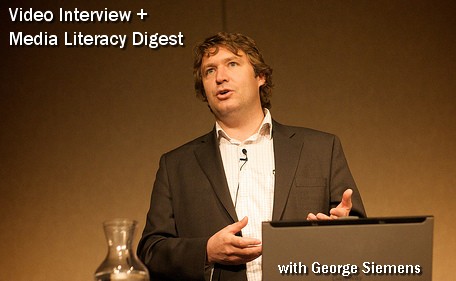 Photo credit: D'Arcy Norman
As I have promised you last week, George Siemens has made himself available for a short, informal video conversation in which we have discussed several interesting topics that some of you had also suggested. [I was not able to bring in all of your suggested questions, both because of the limited time available in this conversation (the video runs about 32 mins) and also because I have gotten some of your suggested queries way too late to use them in this videoconference.]
If you are interested in seeing me and George talk about the state of education and schooling today and the down-to-the-ground issues a parent of any teenager meets today you may find this enjoyable to watch. The other topics we cover include a simplified explanation of connectivism and its relevance to non academics, as well as education future direction and social media hype.
Here the video interview and, right after it, George's habitual quality selection of issues, topics and resources to keep an eye on while trying to make sense of it all.
Photo credit: D'Arcy Norman
As I have promised you last week, George Siemens has made himself available for a short, informal video conversation in which we have discussed several interesting topics that some of you had also suggested. [I was not able to bring in all of your suggested questions, both because of the limited time available in this conversation (the video runs about 32 mins) and also because I have gotten some of your suggested queries way too late to use them in this videoconference.]
If you are interested in seeing me and George talk about the state of education and schooling today and the down-to-the-ground issues a parent of any teenager meets today you may find this enjoyable to watch. The other topics we cover include a simplified explanation of connectivism and its relevance to non academics, as well as education future direction and social media hype.
Here the video interview and, right after it, George's habitual quality selection of issues, topics and resources to keep an eye on while trying to make sense of it all.
Media Literacy: Making Sense Of New Technologies And Media by George Siemens - Aug 23 08
 Photo credit: D'Arcy Norman
As I have promised you last week, George Siemens has made himself available for a short, informal video conversation in which we have discussed several interesting topics that some of you had also suggested. [I was not able to bring in all of your suggested questions, both because of the limited time available in this conversation (the video runs about 32 mins) and also because I have gotten some of your suggested queries way too late to use them in this videoconference.]
If you are interested in seeing me and George talk about the state of education and schooling today and the down-to-the-ground issues a parent of any teenager meets today you may find this enjoyable to watch. The other topics we cover include a simplified explanation of connectivism and its relevance to non academics, as well as education future direction and social media hype.
Here the video interview and, right after it, George's habitual quality selection of issues, topics and resources to keep an eye on while trying to make sense of it all.
Photo credit: D'Arcy Norman
As I have promised you last week, George Siemens has made himself available for a short, informal video conversation in which we have discussed several interesting topics that some of you had also suggested. [I was not able to bring in all of your suggested questions, both because of the limited time available in this conversation (the video runs about 32 mins) and also because I have gotten some of your suggested queries way too late to use them in this videoconference.]
If you are interested in seeing me and George talk about the state of education and schooling today and the down-to-the-ground issues a parent of any teenager meets today you may find this enjoyable to watch. The other topics we cover include a simplified explanation of connectivism and its relevance to non academics, as well as education future direction and social media hype.
Here the video interview and, right after it, George's habitual quality selection of issues, topics and resources to keep an eye on while trying to make sense of it all.

